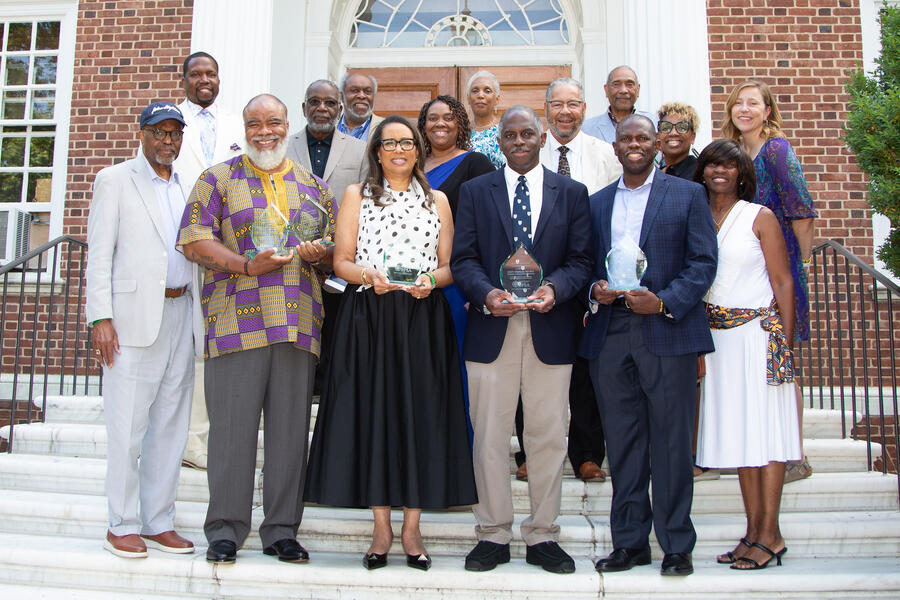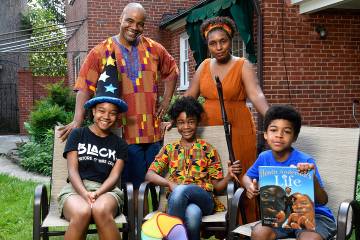Five new members were inducted into the Indispensable Role of Blacks at Johns Hopkins during the university's annual Juneteenth celebration on Friday, June 20.
The project celebrates the contributions of faculty, staff, students, alumni, and community members at Johns Hopkins by highlighting trailblazing figures who have strengthened the institution's legacy. This year's inductees are HIV researcher Joel N. Blankson, historian Nathan Connolly, engineer Cleon Davis, human resources leader Cherita Hobbs, and scholar Shani Mott.
"It is with pride that we honor the newest inductees," said Calvin Smith Jr., the university's deputy chief of staff for public safety and co-chair of the Indispensable Role of Blacks project along with Lorraine Smith. "Our distinguished honorees are leaders within Johns Hopkins and in their respective communities. Their achievements exemplify the excellence and resilience that define the legacy of Black faculty, staff, and students at Johns Hopkins. We are immensely proud to recognize their invaluable contributions and celebrate their enduring impact on our institution and beyond."
Juneteenth recognizes the date in 1865 when Texas residents—including roughly 250,000 enslaved people—learned that all enslaved people had been freed. Although the Emancipation Proclamation went into effect on Jan. 1, 1863, and declared all enslaved people to be freed, the news did not reach Texas until two and a half years later. Celebrations have evolved over the years and often include not only festivities but also educational activities promoting the preservation of Black culture, and Junteenth became a federal holiday in 2021. Johns Hopkins observed the Juneteenth holiday on June 19.
More on this year's inductees in the Indispensable Role of Blacks at Johns Hopkins:
Joel N. Blankson
Champion of science, dedicated mentor

Image caption: Joel N. Blankson
As a clinical fellow at Johns Hopkins in the early 2000s, Joel Blankson encountered a patient living with HIV who, remarkably, required no medication to control the virus. Blankson's fascination with the phenomenon—known as elite suppression—set the course for his pioneering career in HIV research.
Blankson first recognized the scientific urgency of HIV as a college student in New York City during the height of the AIDS crisis. Through a tri-institutional program across Cornell, Rockefeller University, and Memorial Sloan Kettering, he earned his Ph.D. in immunology and his medical degree back-to-back.
Now a professor of medicine and molecular and comparative pathobiology at the Johns Hopkins School of Medicine, Blankson is internationally recognized for his leadership in HIV cure research. He was the first to clearly demonstrate that elite suppressors—those who control HIV without medication—aren't protected by a weakened virus, but by exceptional immune defenses. His findings helped shift HIV cure strategies toward immune-based control rather than total eradication, offering hope that a "functional cure of the disease is possible," his nominators for IRB membership write.
As a clinician, Blankson has led the inpatient HIV service at Johns Hopkins since 2008, his work at the bedside driving his clinical observations. As a teacher, he personally trained every Osler medical resident in HIV care between 2010 and 2020.
Blankson's scientific contributions have earned him election to the American Society of Clinical Investigation and fellowship in the American Academy of Microbiology, and he has served as an associate editor for the Journal of Clinical Investigation. In recent years, his research has expanded into immune responses in COVID-19 and Mpox.
At Johns Hopkins, Blankson has also played a critical behind-the-scenes role advancing diversity in medicine, reviewing hundredsof applications from underrepresented candidates and helping build a mentoring pipeline to strengthen graduate school, residency, and fellowship programs for more than two decades.
"That work matters to me," he says.
Many of those he helped recruit are now faculty at Johns Hopkins and other institutions, his nominators note, "and still consider Joel to be their mentor and advocate."
Nathan Connolly
Historian, intellectual leader
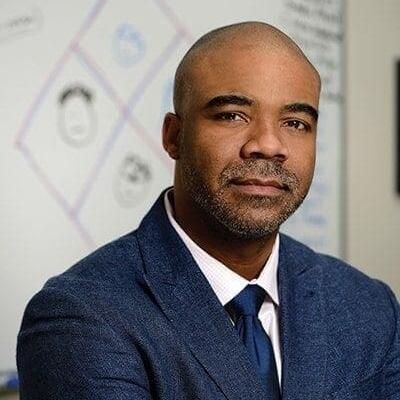
Image caption: Nathan Connolly
A leading historian of race, capitalism, and power, Nathan Connolly has spent his career exposing how institutions create and uphold inequality, with work that bridges academic scholarship and public discourse.
Connolly's 2014 book, A World More Concrete, reframed the story of segregation by showing how landlords, officials, and developers in South Florida—where he grew up—profited by systematically excluding Black communities from property and power in the Jim Crow era. As a lead architect of Mapping Inequality, the digital project that made 1930s redlining maps accessible to the public, Connolly helped uncover how government-sanctioned racism shaped American cities. The resource attracted over a million users, becoming indispensable to educators, policymakers, and activists.
After earning his PhD in history from the University of Michigan, Connolly joined Johns Hopkins in 2008. He immediately saw the university as both a place of profound potential and a reflection of historical exclusions.
"I really do believe in the importance of universities as protectors of possibility for civil society," he says. "But you have to be willing to take a close investigation of your own intellectual practices."
That conviction pulled him into the university's inner workings: faculty searches, committees, curricular reforms. He has mentored students, launched programs, and pushed Johns Hopkins to reckon more deeply with its own history and responsibilities. As director for five years of the Racism, Immigration, and Citizenship program (now the Chloe Center), Connolly helped secure a $4.4 million Mellon Foundation grant to amplify Black humanities scholarship and deepen ties to Baltimore communities. A major outcome was the creation of the Critical Diaspora Studies major.
"Students were telling us, 'We can't go out as doctors or scientists without understanding the cultural problems our patients will face,'" Connolly says.
With his late wife and fellow IRB inductee, Shani Mott, and Jennifer Kingsley, director of JHU's Program in Museums and Society, Connolly co-led Housing Our Story, an oral history project recording the experiences of Black staff at Hopkins. These narratives—capturing exclusion, resilience, and dignity—helped fuel structural change, including the launch of the university's Staff Advisory Council in 2023.
During his time at Johns Hopkins, Connolly has mentored an emerging generation of scholars who have become authors, professors, and leaders themselves, extending the influence of his teaching.
Connolly emphasizes that his legacy at Hopkins has been inextricably linked with Mott, a beloved Africana Studies lecturer who passed away in 2024.
"In all things, and in all ways, my time at Hopkins is her time at Hopkins," he says. "She was my thought partner and collaborator, and so there is no distinction."
Cleon Davis
Engineer, teacher, Black Faculty and Staff Association leader
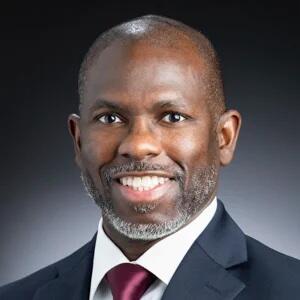
Image caption: Cleon Davis
As a Johns Hopkins engineer, Cleon Davis designs satellite constellations that help connect and protect the globe. As a leader at Johns Hopkins, he's worked from within to press for institutional change and expand opportunity.
"I've always wanted to make the places I've worked better for the people who come after me," he says.
Raised in Riviera Beach, Florida, Davis earned electrical engineering degrees from Florida A&M University then a PhD from the Georgia Institute of Technology. Along the way, he modeled combustion engines for Ford, studied lasers at a Navy lab, and designed acoustic sensors to improve semiconductor packaging.
While finishing his doctorate, he found the Johns Hopkins University Applied Physics Laboratory through a career fair hosted by the National Society of Black Engineers. The lab's hybrid of research and real-world application appealed to him immediately—"not purely academic, not purely industry," he says. "APL was right in that sweet spot."
Today Davis leads both people and programs at APL. He serves as program manager in the National Security Space Mission Area of the Space Exploration Sector, where his team models satellite constellations essential to GPS, global internet, and national defense.
"We can't afford to be wrong," he says.
Equally significant to Davis is his role as a professor—and, since 2024, as chair—of the Electrical and Computer Engineering program at Johns Hopkins University Engineering for Professionals. Under his guidance, the graduate program—now majority online—has grown to be the largest of its kind in the nation, with over 100 courses and 80-plus faculty members. Davis has personally mentored dozens of students through their thesis work.
Early in his time at Johns Hopkins, Davis found community in the BFSA, where he served in various leadership roles before becoming president in 2015. In his two years at the helm, Davis opened new lines of dialogue with university leadership and worked to improve access and representation in hiring. During that time, he also helped launch a strategic mentoring program at APL, pairing junior staff with senior advocates to boost careers and overcome structural barriers to advancement.
Davis says he's proudest of the colleagues he's supported and watched thrive—those who were once overlooked or stuck, but now leaders.
"If I've made it easier for someone else to succeed," he says, "then I've done something meaningful."
Cherita Hobbs
Human Resources strategist, community pillar
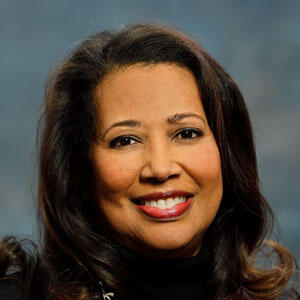
Image caption: Cherita Hobbs
Baltimore-area native Cherita Hobbs started working at Johns Hopkins in 1981 as a young administrator supporting the university's Human Resources office. That first job launched a path that would make her a defining presence in HR leadership at Hopkins, helping shape policies, culture, and support systems across nearly every corner of the institution.
Over the years, Hobbs has led HR programs and operations for the schools of Medicine, Public Health, Nursing, JHPIEGO, and the Johns Hopkins Federal Credit Union, and later assumed a university-wide leadership role in employee and labor relations. Today, as executive director of strategic human resources, she oversees HR services for 11 academic divisions and four academic centers, with a focus on efficiency, workforce diversity, central HR operations, and employee engagement.
"What excites me most is the opportunity to support staff at all levels," says Hobbs. "HR has given me a platform to navigate complex and sensitive staffing matters with care, fairness, and compassion."
Hobbs is known for pushing HR systems to evolve with the needs of the people they serve. Over the years she has negotiated numerous contracts with bargaining units and mentored thousands of employees and managers, showing "a tremendous capacity to listen and demonstrate empathy for the challenges employees face," according to Kathy Forbush, executive director of Talent Management at Johns Hopkins.
As one of the longest-serving Black women in senior leadership at Hopkins, Hobbs has co-chaired diversity councils, advised on economic inclusion, and worked to advance equity in hiring and advancement. She was an early advocate for the HopkinsLocal initiative, partnering with university offices and leaders boost hiring directly from the surrounding Baltimore community.
"Cherita has been a fierce advocate of creating more equitable workplaces where all JHU employees, especially those who are historically underrepresented, can grow, thrive, and be successful," Forbush says.
Hobbs holds both a bachelor's and master's degree from the Johns Hopkins School of Professional Studies and remains an active contributor to university committees focused on inclusion, policy, and HR strategy.
"It has been an honor to grow my career at JHU, and even more meaningful to know that my work has had a positive impact on both leadership and staff," Hobbs says. "I am deeply grateful to the IRB for recognizing my commitment and dedication, and for the privilege of being inducted into this prestigious program."
Shani Mott
Scholar, social justice champion
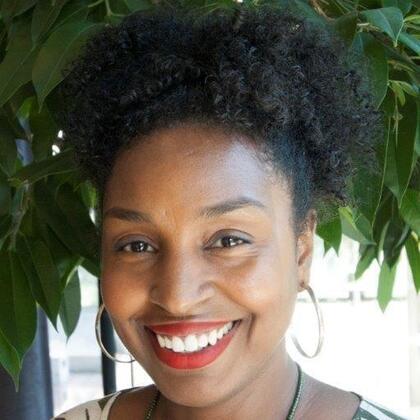
Image caption: Shani Mott
Anyone who took a class with Shani Mott learned quickly not to coast. Her expectations were high—because she viewed her students as thinkers whose ideas mattered.
"She made students have to respect Africana Studies as a major," says her husband and longtime collaborator, historian Nathan Connolly. "You couldn't just waltz in. You had to deal with Dr. Mott."
As a lecturer in the Center for Africana Studies and Department of History at Johns Hopkins, Mott left an imprint beyond her title. Her influence stretched across institutional reform, public scholarship, and the lives of students and colleagues who found in her an unflinching advocate.
Before joining Johns Hopkins, Mott earned her doctorate from the University of Michigan and led Africana Studies at Barry University. Her work often blurred the lines between academic and activist. Trained in American culture and literature, she probed how racial language is molded by intellectual hierarchies, funding agendas, and government policy. In her teaching, she pushed students to interrogate how those forces played out in their own lives.
She taught with "a rigor and perspicaciousness that was infectious," says Minkah Makalani, director of the Center for Africana Studies at Johns Hopkins. "Her students understood that she demanded they take themselves seriously as thinkers."
One of her most visible contributions at Johns Hopkins was the Housing Our Story oral history project, in which she interviewed Black campus workers whose voices had long been excluded from the university's archives. The effort led to meaningful reform, including the 2023 launch of a Staff Advisory Council and shifts to equity policy.
"She was an incredible interviewer," Connolly recalls. "In the wake of her earnest questions, many of these people wanted to know, 'What are you going to do with our story? How can we actually go about changing the institutional landscape?'"
Mott also helped organize the Freedom Papers exhibit at the Sheridan Libraries in 2016 and, in 2017, the Life Sentences conference on incarceration and the humanities, projects that centered lives and perspectives rarely highlighted in official narratives. A driving force behind the intellectual renewal of Africana Studies, Mott fought to make the field a space of both academic rigor and political seriousness. As director of undergraduate studies for the center, she reshaped how the program was perceived, particularly by STEM students who gravitated to her courses. Beyond campus, she co-directed Orita's Cross Freedom School and created an educational YouTube series during the pandemic.
Mott died of adrenal cancer in March 2024, just shy of her 48th birthday. Her final public act was testifying in an eight-hour deposition for a housing discrimination lawsuit she and Connolly had filed—arguing that their home in a historically white Baltimore neighborhood had been appraised at far lower value because they were Black.
"I had the chance to see firsthand her literally put her life on the line for justice," Connolly said. "Her ability to speak forcefully and be so crystal clear about how real estate works—it was a master class."
Posted in University News
Tagged nathan connolly, bfsa, indispensable role of blacks at jhu




